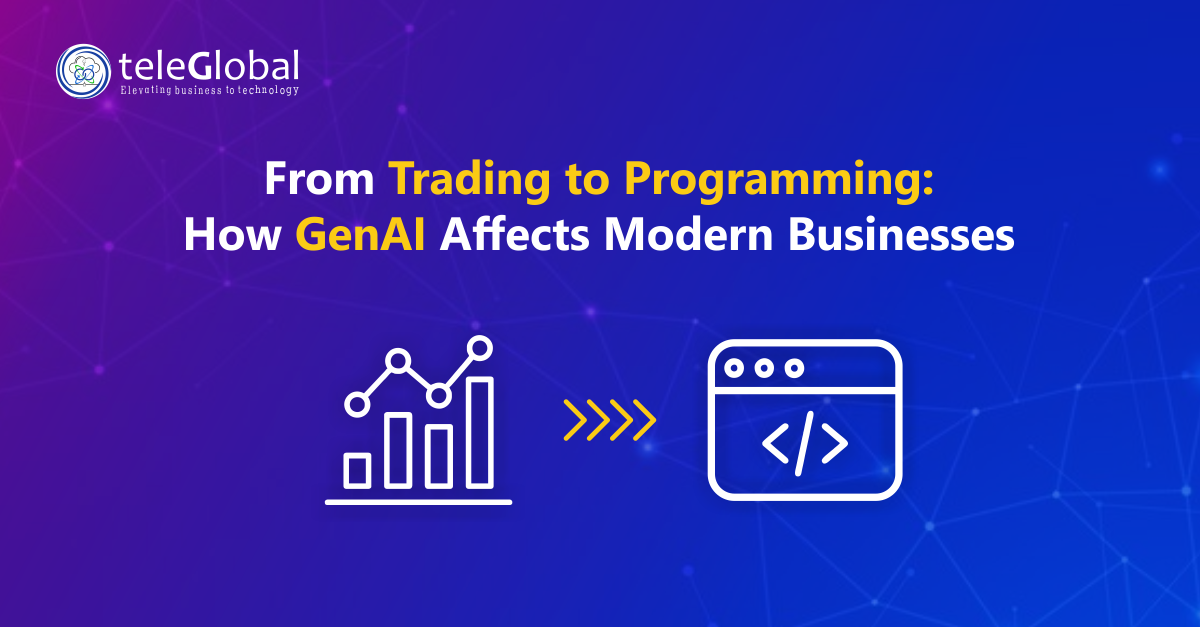
| Author: Ashish Kumar | Published: 02-Feb-2023 |
The landscape of contemporary companies is witnessing a transformative shift as Generative Artificial Intelligence (GenAI) transcends its conventional role in programming and infiltrates various aspects of trade. Formerly relegated to the realm of automating repetitive coding tasks, GenAI is now emerging as a catalyst for innovation, decision-making, and efficiency in the trading sector. This paradigm shift is reshaping the way companies approach programming and trade, fostering a new era of possibilities.
Traditionally, programming has been the domain of human coders translating business requirements into machine-readable instructions. However, with the advent of GenAI, this process is undergoing a profound evolution. GenAI’s ability to understand natural language and generate code opens avenues for automating coding tasks, accelerating the development lifecycle, and reducing the potential for human error. This not only streamlines the programming process but also allows human programmers to focus on more complex and strategic aspects of software development.
In the context of trade, GenAI is proving to be a game-changer. The technology’s predictive analytics and pattern recognition capabilities empower companies to make more informed trading decisions. By analyzing vast datasets and identifying market trends, GenAI assists traders in navigating the complexities of financial markets with greater accuracy. This data-driven approach enhances risk management and helps companies optimize their investment strategies, ultimately contributing to improved financial outcomes.
Moreover, GenAI’s impact on trade extends beyond analytics to the automation of trading activities. Algorithmic trading, powered by GenAI, executes trades at speeds and frequencies that surpass human capabilities. This automation not only ensures quick response times to market fluctuations but also operates without emotional biases, a factor that can significantly impact traditional trading approaches. The result is a more efficient and objective trading environment, where decisions are based on data and algorithms rather than human intuition.
As companies transition from conventional programming methodologies to integrating GenAI, the implications for efficiency and innovation become increasingly evident. The technology’s ability to generate creative solutions is particularly noteworthy. In programming, GenAI can offer suggestions for code improvements, optimizations, and even propose alternative algorithms. This collaborative approach between human programmers and AI enhances the overall quality of code, fostering a culture of continuous improvement and innovation within development teams.
Similarly, in the realm of trade, GenAI’s creative capabilities contribute to strategy development. By generating alternative trading strategies and simulating their potential outcomes, GenAI assists traders in exploring new avenues and diversifying their approaches. This not only mitigates risks associated with relying on single strategies but also opens doors to innovative trading methodologies that may not have been apparent through traditional analyses.
However, the integration of GenAI into programming and trade is not without its challenges. Ethical considerations, transparency, and accountability are crucial aspects that companies must navigate. Ensuring that AI-driven decisions align with ethical standards and avoiding biases in both code generation and trading algorithms are paramount. Moreover, as GenAI becomes increasingly sophisticated, there is a growing need for comprehensive regulations and frameworks to govern its use in programming and trade, safeguarding against potential misuse and ensuring responsible deployment.
In conclusion, the effect of GenAI on contemporary companies transitioning from programming to trade is profound. From automating coding tasks to revolutionizing trading strategies, GenAI is reshaping how companies operate in these domains. The collaborative synergy between human expertise and artificial intelligence is unlocking unprecedented levels of efficiency, innovation, and decision-making capabilities. As companies navigate this transformative landscape, the responsible and ethical integration of GenAI will be crucial in ensuring that the transition enhances rather than compromises the core values of programming and trade in the evolving business ecosystem.
